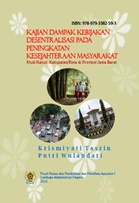
Tim penulis:
Krismiyati Tasrin, Putri Wulandari
Tahun:
2012
Lokus:
Provinsi Jawa Barat
ABSTRAK
After more than 10 years of decentralization policies implemented in Indonesia, it is considered essential to conduct an evaluation of the implementation of decentralization policy in increasing public welfare. The decentralization in this study is measured by three dimensions: fiscal, functional and personnel. These three variables are not made in a single composite index, but a separate index that subsequently made the correlation analysis with each variable of public welfare which includes variables of economy, infrastructure, education and health. By using panel data from 25 districts/cities in West Java Province in 2004-2010, the findings stated that in economics area, decentralization has not shown an effect, whether viewed from the fiscal decentralization variables, functional decentralization and decentralized personnel. It is shown by the absence of the significant coefficients of the variables. The determinant that significantly affect economic growth in the region is explained by the presence of control variables, namely the variable investment and labor where each variable has statistical significance by t test at ? = 1% and have a positive sign.
Significance and magnitude of the influence of the variable investment and labor could be explained by the Neo Classical Production Function theory in which both the capital (investment) and labor are factors that determine productivity. Furthermore, when viewed from the value of the coefficient of determination (R2), amounting to 0.98258, indicating that model 1 is able to explain variation of regional economic growth by 98.26%, however, this effect does not come from decentralized variable, but it comes from the variable investment variable labor. In infrastructure area, personnel decentralization is the only variable that has an influence on changes in road infrastructure variables. However, the effect shown by the decentralization of personnel were negative variable. In education area, there are two variables that affect significantly on the accessibility of the public services in education: functional and personnel decentralization. However, both these variables have oposite effects. In the health area, it is found that there is no significant effect on changes in the ratio of the number of physicians per 1000 population. Furthermore, associated with the channel of the decentralization variables that can have an impact on improving people's welfare can be concluded that the variables of functional decentralization and personnel decentralization variable is channels that contribute to the welfare of society.
Berita Lainnya
- Policy Paper Strategi Pengukuran Kompetensi Teknis Bidang Pelatihan ASN
- Policy Brief Pengelolaan Pegawai Non-ASN Teknis Administrasi Di Instansi Pemerintah
- Policy Brief Coaching dan Mentoring: Solusi Peningkatan Kinerja di Tempat Kerja
- Policy Brief Akselerasi Pengembangan Kompetensi Perangkat Desa
- Policy Brief Meningkatkan Motivasi Kerja Perangkat Desa Melalui Penguatan Status Kepegawaian


